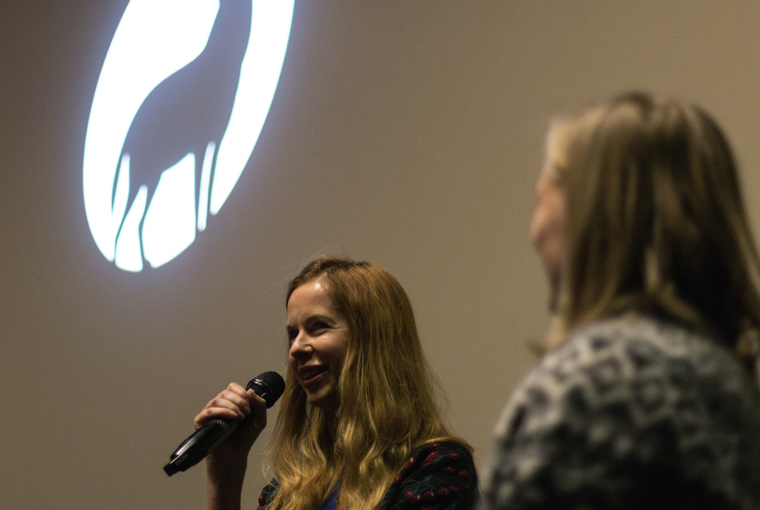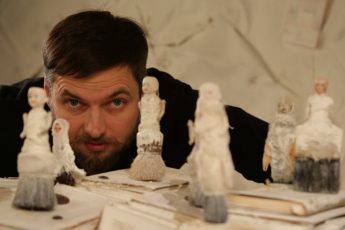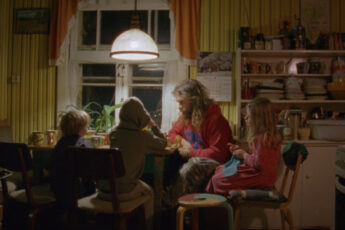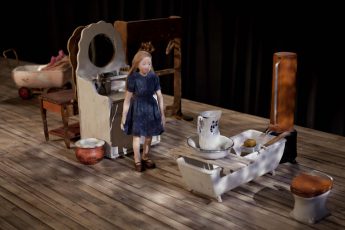
We met Estonian Filmmaker Maria Avdjushko at the Tallin Black Nights Film Festival to speak to her about the idea behind her debut feature “Fire Lily”, the switch from acting to directing, and women’s standing in the film industry.
Your debut feature Fire Lily has a very interesting premise. How was it that you came to the idea?
This idea is actually quite old. I had a long and successful career as an actress behind me, so I wrote the screenplay for myself. Now it has changed a bit, but usually in this Post-Soviet area there are very few good female roles. In cinema in general, there are thousands of very, very good roles for male actors, but much less for actresses. So I wrote it for myself and thought that I would find a director for it. But actually when I started writing, I didn’t initially imagine that I would really end up with a movie. It was in order to get rid of something – when you start writing it’s because there’s an impulse that tells you to. So then I forgot about the script, but one New Year’s Eve I was at a party at the Estonian Film Institute and I met Aet Laigu, my producer. I told her about it and she asked me to send it to her, and after she read it, she said “OK, let’s do it.” But then, of course, we re-wrote it several times, and there were two other script writers besides me.
Did you have ambitions to direct before, or did you decide to do it because the opportunity came up?
I’ve been in the film industry for quite a long time, and as well as being in many movies as an actress I’ve also worked as a producer. I also worked as a script writer for other authors, and before this film I made several documentaries – small cultural documentaries – as well as two shorts. So it was a natural step. But of course I couldn’t do everything for this movie, so I had to give up my dream and find another actress to play the main character. I wanted to create a story with a woman at the center, so I did it through her and there’s no scenes without her.
How was the casting process, given that you wrote the role for you to play yourself?
It’s actually the first movie of Ingrid Isotamm, the actress who plays the main character. I know actors well from having worked on stage for so long, and there are really a lot of very good actors around, so if you’re an actor you need a lot of luck to find your moment of success. So I hope I provided this moment for her – she was good, even though she wasn’t very experienced. I think my biggest strength is working with actors, because I really know what they’re waiting for, and the most important thing is that you trust each other. Like in life – if you trust your actors and your actors trust you then it can create very good moments. It was also my first time working with a child actor. Here we don’t have these kind of trained child actors that go to drama school, so you need to be lucky to find a child who is naturally talented. It’s amazing what children can do on set, because they’re very quick to realize they have power. They can say “I don’t like this actress” and then they get replaced with another one. The boy in this film was only five years old, and he was simply born an actor. He’s very, very talented and he just switches on like that. So it was great to work with him. He’s quite believable, and I think he plays better than some of the adults.
Was it hard to get funding for a first feature?
Yes, it was hard. I’m not so young anymore and no-one was waiting for me to make this movie, so it was difficult to get funding. We also had a co-production with producers from Belgium and France, and in fact our cameraman, Thierry Pouget, was from France. Of course, I would have loved to have a bigger budget. We had so few shooting days so there was no time for experimenting. We had to shoot everything very precisely. We had to do a lot every day, so it had to be well planned.
So what’s your focus now? Do you plan to keep directing or changing roles?
This year was quite crazy for me since I released three movies – my documentary, my short and also this film. Right now I’m developing a documentary about my step-father, who was an experimental theater director here. I also have plans for another feature, they’re still quite fresh. These shooting periods are always very tough, they’re mad periods. You become absolutely socially autistic – there is no family, no friends, nothing. So when you come out of this state it always leaves you in a depression, because you get used to it and then suddenly you find yourself in a completely different world.
Was your approach to the story of Fire Lily influenced by any particular films?
I could tell you which films, but you probably wouldn’t see what they have in common. Of course I’m influenced by everything, and I know that there are similar films around. Lots of people told me that they made the connection with the Latin American film The Untamed (La región salvaje, by Amat Escalante), which is also about a woman and her sexuality, but it features a kind of extra-terrestrial creature. Of course, many people also drew the parallel with Rosemary’s Baby. But my intention was to create tension around the fact that there are somehow miracles in our lives that we don’t know how to explain, and our brains work in strange ways that go beyond reality, and that’s the reality that she creates so that she can live alone but go on. The stalker character is a potential father for her baby but she gets rid of him – we don’t know whether she kills him or not, but he disappears. So in this movie there are potential fathers, but she chooses to go on to live her own life and find hope, and her reason for living.
Of course, Rosemary’s Baby is much more of a straight-forward horror than Fire Lily, which is more of a combination of genres, with some horror but also thriller and drama.
That was my idea. When I’m watching movies, I really enjoy not knowing what’s going to happen next, so I also wanted to create that kind of tension. And also, when movies offer a clear solution, it’s usually very banal, and it loses a lot by stopping people from having the ability to make up the end for themselves, the way they think it is. In fact, the script originally had a different ending, but when we watched the rough cut all the mysticism just disappeared. So we decided it was better to leave it the way it is.
I found it interesting that this year a lot of the films from Estonia, and also the Baltic States more broadly, are dealing with themes about parenthood, pregnancy and adoption.
Actually, I think it’s a general, international trend. I just came back from the Mannheim-Heidelberg Film Festival, and almost all the movies I watched were about pregnancy and abortion. I don’t know if it’s part of this Feminist movement and #MeToo but there seem to be a lot of female directors making these kinds of films, and I’m very happy about it. I think now in Estonia the majority of directors are women, although of course before it was an exclusively masculine profession, and people thought only men could direct.
Did you specifically want to make a film that addressed female sexuality in an unusual way?
Yes, I was really intrigued by the idea that we don’t know where our children come from. It’s a mysterious idea in itself, but then I read in the newspaper that someone carried out some kind of sociological research where women had to answer the question “who is the father of your child?” Twenty percent of women replied by saying “I don’t know.” Twenty percent is a lot! Imagine what kind of lives these women must have… Everyone has a secret. It gave me a lot of ideas to create this story – we really don’t know, it’s something so mysterious.
What kinds of responses have you had to the film?
I’ve had a lot of different responses from women. A lot of women have written to me about the movie, and in Mannheim I met wonderful audiences, and I was very happy that they liked the film. Here in Estonia we didn’t get much of an audience in the cinemas because in this area we spend most of the year waiting for the summer, and the film was released just as the sunny season started, so I haven’t had as many reactions from local audiences yet. But luckily movies don’t just disappear!




Leave a Comment